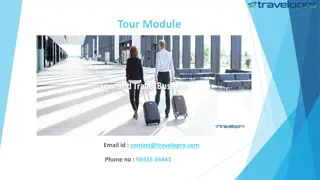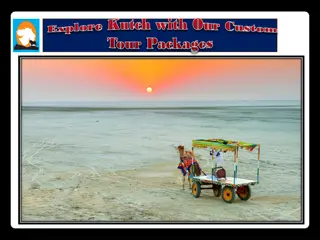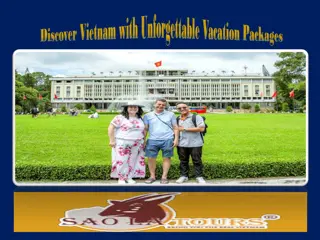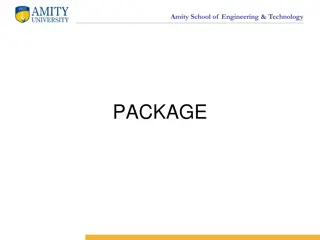Types of Tour Packages Explained: From Adventure to Group Tours
Tour operators put together package tours combining services like transport, accommodation, meals, and guides. Package tours include transfers, accommodation, cruises, rental cars, and entrance fees. Special-interest tours focus on specific themes, while adventure tours cater to physically demanding activities. City and regional tours last a day and cover cultural sites. Group tours follow set itineraries based on traveler numbers.
Download Presentation

Please find below an Image/Link to download the presentation.
The content on the website is provided AS IS for your information and personal use only. It may not be sold, licensed, or shared on other websites without obtaining consent from the author.If you encounter any issues during the download, it is possible that the publisher has removed the file from their server.
You are allowed to download the files provided on this website for personal or commercial use, subject to the condition that they are used lawfully. All files are the property of their respective owners.
The content on the website is provided AS IS for your information and personal use only. It may not be sold, licensed, or shared on other websites without obtaining consent from the author.
E N D
Presentation Transcript
HOW ARE TOURS PUT TOGETHER BY TOUR OPERATORS
Package tours are excursions or holidays which package a variety of services together to make a single combined trip. Commonly they combine such things as transport, accommodation and meals. They may also include the provision of a tour guide and/or leader. Tours can be long or short in duration and distance. They may be a one-day or overnight package, or they could be a period of a month or more.
Packaged tours typically include: Packaged tours typically include: All transfers between airports/harbours/stations and hotels Twin share tourist and first-class accommodation with private facilities, as specified Cruises Rental cars Entrance fees to attractions Insurance Tickets for entry to events or attractions
The types of packages available in todays market are vast and varied. This ensures all consumers needs and desires are met. Package tours can be further broken down into specific tour types. Tours available range from Special-interest tours, Adventure tours, City or Regional tours, Group tours and Fully Escorted tours. Special-interest tours are designed around a particular interest area which could include arts, food and wine, sport, cultural or agricultural. Specialist tours may include an expert or celebrity guide who relates to the theme of a tour (e.g. a gardening expert accompanying a garden tour, or an art expert accompanying an art tour).
Adventure tours are designed to allow the consumer to participate in their area of interest for the length of the tour and more experience based. They generally are physical and require a certain level of fitness, however, can sometimes be modified to meet your needs depending on the other travelers. Some examples of this tour type include diving, rock or mountain climbing, horse riding, skiing or cycling
City/regional tours normally last for one full day or less. They follow a fixed itinerary and will visit areas of interest in a specific place, whether that is historic, religious or cultural, refreshments or meals are often included
Group tours also follow a fixed and pre-arranged itinerary. They often only take place depending on the number of travelers i.e. they require a certain number of travelers in order to go ahead or it becomes a financial cost rather than profitable. It is also worth noting there are a maximum number of travelers on group tours too, as determined by the mode of transport a 56 seater coach can accommodate no more passengers and therefore the number limit is defined. Group tours are generally always escorted or a tour guide service is provided.
Cost saving and budgeting - the price of a trip when organised as a package is generally less as travel agencies bulk buy their package deals and therefore can sell the tours at a lower and more competitive rate. This is an instant cost saving benefit for the consumer, as the discount travel agencies receive is generally passed on to the consumer. Also, as the tour often includes all meals or trips for example, this reduces any uncertainty about the additional costs and allows the consumer to budget properly for costs associated with their travel. For example, if airport pick-ups or taxi transfers are pre- booked and paid for beforehand there is no potentially expensive surprise when travelling to the accommodation on arrival at the destination.
Responsibility is on the operator - the lack of responsibility on the traveler is an advantage. If something goes wrong, e.g. a flight is delayed, resulting in the traveler missing a connecting flight, it is not the traveler s responsibility to arrange a new ticket. The responsibility lies with the airline or tour operator. In a certain respect, travelers can relax knowing if something goes wrong, someone else is there to solve the problem. Convenience and time-saving - this is definitely the most convenient way to arranging a vacation or tour. The travel agency deals with all the arrangements relating to airlines, hotels, transfers directly through the tour provider. This saves the consumer the effort and the time of contacting each company/service individually.























